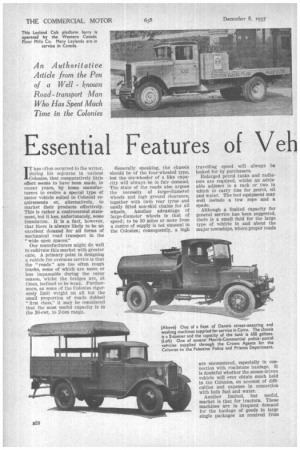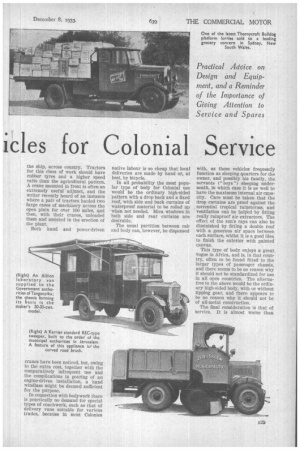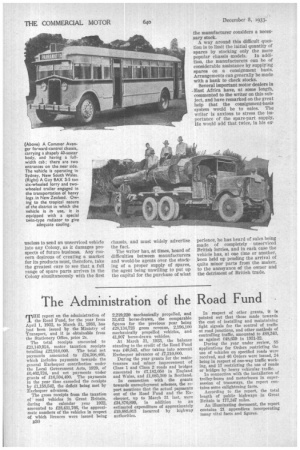Essential Features of Veh idles for Colonial Service
Page 42

Page 43

Page 44

If you've noticed an error in this article please click here to report it so we can fix it.
IT has often occurred to the writer, during his sojourns in various Colonies, that comparatively little effort seems to have been made, in recent years, by home manufacturers to evolve a special type of motor vehicle suited to Colonial requirements or, alternatively, to market their products effectively. This is rather a controversial statement, but it has, unfortunately, some foundation. It is a fact, however, that there is always likely to be an excellent demand for all forms of mechanical road transport in the "wide open spaces:"
Our manufacturers might do well to cultivate this market with greater care. A primary point in designing a vehicle for overseas service is that the "roads" are too often rough tracks, some of which are more or less impassable during the rainy season, whilst the bridges are, at times, inclined to be weak. Furthermore, as cement the Colonies rigorously limit weight on all but the small proportion of roads dubbed "first class," it may be considered that the most useful capacity is in the 30-cwt. to 2-ton range. Generally speaking, the chassis should be of the four-wheeled type, but the six-wheeler of a like capacity will always be in fair demand. The state of the roads also argues the necessity of large-diameter wheels and high ground clearance, together with twin rear tyres and easily fitted non-skid chains for all wheels. Another advantage of large-diameter wheels is that of speed; to be 50 miles or more from a centre of supply is not unusual in the Colonies; consequently, a high
travelling speed will always be looked for by purchasers.
Enlarged petrol tanks and radiators are required, whilst an advisable adjunct is a rack or two in which to carry tins for petrol, oil and water. The tool equipment may well include a tow rope and a spade.
Although a limited Capacity for general service has been suggested, there is a small field for the large type of vehicle in and about the major townships, where proper roads are encountered, especially in connection with roadstone haulage. It is doubtful whether the steam-driven vehicle will ever obtain much hold In the Colonies, on account of difficulties and expense in connection with both fuel and water.
Another limited, but useful, market is that for tractors. These machines are in frequent demand for the haulage of goods in larg single packages as received from the ship, across country. Tractors for this class of work should have rubber tyres and a higher speed ratio than the agricultural pattern. A crane mounted in front is often an extremely useful adjunct, and the writer recently heard of an instance where a pair of tractors hauled two large cases of machinery across the open plain for over 100 miles, and then, with their cranes, unloaded them and assisted in the erection of the plant. • Both hand and power-driven cranes have been noticed, but, owing to the extra cost, together with the comparatively infrequent use and the complications in gearing of an engine-driven installation, a hand windlass might be deemed sufficient for the purpose.
In connection with bodywork there is practically no demand for special types of coachwork, such as that of delivery vans suitable for various trades, because in most Colonies native labour is so cheap that local deliveries are made by hand or, at best, by bicycle.
In all probability the most popular type of body for Colonial use would be the ordinary high-sided pattern with a drop back and a fixed roof, with side and back curtains of waterproof material to be rolled up when not needed. Mica windows in both side and rear curtains are desirable.
The usual partition between cab and body can, however, be dispensed with, as these vehicles frequently function as sleeping quarters for the owner, and possibly his family, the servants (" boys ") sleeping underneath, in which case it is as well to have the maximum internal air capacity. Care must be taken that the drop curtains are proof against the torrential tropical rainstorms, and ventilation can be helped by fitting really rainproof air extractors. The effect of the sun's rays can also be diminished by fitting a double roof with a generous air space between each surface, whilst it is a good idea to finish the exterior with painted canvas.
This type of body enjoys a great vogue in Africa, and is, in that country, often to be found fitted to the larger types of passenger chassis, and there seems to be no reason why It should not be standardized for use in all open countries. The alternative to the above would be the ordinary high-sided body, with or without tipping gear, and there appears to be no reason why it should not be of all-metal construction.
The final consideration is that of service. It is almost worse than useless to send an unserviced vehicle into any Colony, as it damages prospects of future business. Any concern desirous of creating a market for its products must, therefore, take the greatest care to see that a full range of spare parts arrives in the Colony simultaneously with the first chassis, and must widely advertise the fact.
The writer has, at times, heard of difficulties between manufacturers and would-be agents over the stocking of a proper supply of spares, the agent being unwilling to put up the capital for the purchase of what
the manufacturer considers a necessary stock.
A way around this difficult question is to limit the initial quantity of spares by stocking only the more
popular chassis -models. In addition, the manufacturers can be of considerable assistance by supplying spares on a consignment basis. Arrangements can generally be made with a bank to check stocks.
Several important motor dealers in East Africa have, at some length, commented to the writer on this subject, and have remarked on the great help that the consignment-basis system would be to sales. The writer is anxious to stress the importance of the spare-part supply. He would add that twice, in his ex perience, he has heard of sales being made of completely unserviced British lorries, and in each case the vehicle has, at one time or another, been held up pending the arrival of quite minor parts from the maker, to the annoyance of the owner and the detriment of British trade.




























































































